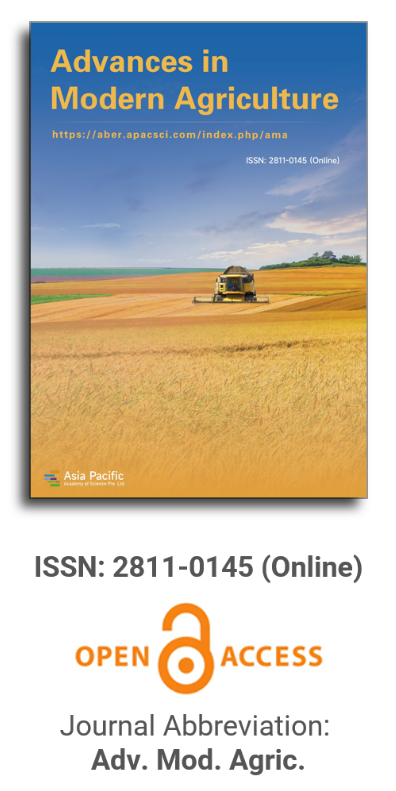


Performance of Cambodia’s made vegetable transplanter for two-wheel tractors under tillage conditions
Vol 5, Issue 3, 2024
VIEWS - 4018 (Abstract)
Download PDF
Abstract
In Cambodia, vegetable crops are planted by hand, making it hard to meet local market demands. However, this production can be boosted by using a mechanical transplanter with two-wheel tractors to cut input costs, when introduced to farmers, while production and productivity can be accelerated. Thus, this research aimed to (1) evaluate the working performance of a locally made vegetable transplanter against manual planting and (2) compare plant survival rates. The study included fabrication, testing, modification, and experiments with farmers, starting from January 2023 to July 2024. The transplanter was fabricated, tested, and improved by the Royal University of Agriculture. Then, two experiments were carried out with a vegetable farming community in Tram Kak District, Takeo Province, Cambodia. Tomato was selected for the testing, choosing seedlings aged four weeks. The randomized complete block design (RCBD) was applied for both experiments with two treatments, manual planting and transplanter use, replicated four times. The results show that the working performance of the transplanter was six times faster than manual planting. Its speed, total field capacity, and planting rate were 1.03 km/h, 0.052 ha/h, and 27 plants/min, respectively, but missed planting was about 4%. Within-row spacing was similar (0.58 m), while using the transplanter made the plants incline at a steeper angle (63°), but could save 81.9% of time, when compared to manual planting. Both treatments had 100% plant survival rates evaluated one week after the transplanting. In short, using the transplanter can save both time and labor, but further assessment should be made with more kinds of fruit vegetable based on different seedling ages, so that the specifications can be confirmed, which is good for actual adoption for farmers.
Keywords
References
- Asian Development Bank. Cambodia Agriculture, Natural Resources, and Rural Development Sector Road Map. Available online: https://www.adb.org/sites/default/files/publication/718806/cambodia-agriculture-rural-development-road-map.pdf (accessed on 12 May 2024).
- Ministry of Industry, Science, Technology & Innovation. Strategic Framework and Programs for Science, Technology and Innovation 2030. Available online: https://misti.gov.kh/public/file/202206301656578708.pdf (accessed on 13 May 2024).
- Ministry of Agriculture, Forestry, and Fisheries. Annual MAFF Report 2021 and Direction in 2022. Ministry of Agriculture, Forestry, and Fisheries; 2022.
- Ministry of Agriculture, Forestry, and Fisheries. Annual MAFF Report 2023 and Direction in 2024. Ministry of Agriculture, Forestry, and Fisheries; 2024.
- National Institute for Occupational Safety and Health (NIOSH). Simple solutions: Ergonomics for farm workers. U.S. Department of Health and Human Services, Public Health Service, Centers for Disease Control and Prevention. 2001.
- OECD. OECD Health Statistics 2020: Definitions, Sources and Methods: Consumption of Vegetables and Fruits, Daily Survey Data. Available online: http://stats.oecd.org/wbos/fileview2.aspx?IDFile=5b61fb4c-1d39-42ef-93c2-b126609edd23 (accessed on 13 May 2024).
- Lyhour H, Borarin B, Manuel RR, et al. Performance of a No-Till Vegetable Transplanter for Transplanting Thai Round Eggplant (Solanum melongena L.) in Conservation Agriculture. Journal of Environmental Science and Engineering B. 2020; 9(6). doi: 10.17265/2162-5263/2020.06.002
- Ritchie H, Rosado P, Roser M. Vegetable consumption per capita. Our World in Data. Available online: https://ourworldindata.org/grapher/vegetable-consumption-per-capita (accessed on 19 May 2024).
- AVRDC—The World Vegetable Center. Strengthening Capacities in Cambodia to Increase Off-Season Vegetable Production. Available online: https://avrdc.org/strengthening-capacities-in-cambodia-to-increase-off-season-vegetable-production/ (accessed on 19 June 2024).
- College of Agricultural and Environmental Sciences, University of California, Davis. Agricultural Innovations Help Cambodian Farmers Thrive. Available online: https://caes.ucdavis.edu/news/agricultural-innovations-help-cambodian-farmers-thrive (accessed on 15 June 2024).
- Du X, Ma G, Mao H. Development of simplified seedling transplanting device for supporting efficient production of vegetable raw materials. Applied Sciences. 2023; 13(18): 10022. doi: 10.3390/app131810022
- Michalska-Klimczak B, Wyszyński Z, Pačuta V, et al. Within-field variability of plant and canopy traits of sugar beet and their relation to individual root mass during harvest. Plant, Soil and Environment. 2020; 66(9): 437-445. doi: 10.17221/325/2020-pse
- Kumar GVP, Raheman H. Development of a walk-behind type hand tractor powered vegetable transplanter for paper pot seedlings. Biosystems Engineering. 2011; 110(2): 189-197. doi: 10.1016/j.biosystemseng.2011.08.001
- Dihingia PC, Kumar GVP, Sarma PK, et al. Hand-Fed Vegetable Transplanter for Use with a Walk-Behind-Type Hand Tractor. International Journal of Vegetable Science. 2017; 24(3): 254-273. doi: 10.1080/19315260.2017.1413477
- Bhambota S, Dixit AK, Manes GS, et al. Field evaluation of a semi-automatic vegetable transplanter for major vegetable crops. The Indian Journal of Agricultural Sciences. 2018; 88(11): 1755-1752. doi: 10.56093/ijas.v88i11.84922
- Javidan SM, Mohammadzamani D. Design, construction and evaluation of semi-automatic vegetable transplanter with conical distributor cup. SN Applied Sciences. 2019; 1(9). doi: 10.1007/s42452-019-1034-y
- Durga ML, Rao AS, Kumar AA. Performance Evaluation of Single Row-Low Horse Power Tractor Operated Vegetable Transplanter. Current Journal of Applied Science and Technology. 2020; 37-44. doi: 10.9734/cjast/2020/v39i4431149
- Abhijit Khadatkar SM, Mathur BB, Gaikwad A, et al. Shrinivas. Biometric Properties of Plug Vegetable Seedlings Relevant to the Design of Vegetable Transplanter. Journal of Agricultural Engineering (India). 2020; 57(1): 16-24. doi: 10.52151/jae2020571.1700
- Ray A, Moses SC. Design and Development of Automatic Universal Chain Type Vegetable Transplanter. Asian Journal of Soil Science and Plant Nutrition. 2024; 10(2): 311-319. doi: 10.9734/ajsspn/2024/v10i2288
- Narang MK, Dhaliwal IS, Manes GS. Development and Evaluation of a Two-Row Revolving Magazine Type Vegetable Transplanter. Journal of Agricultural Engineering. 2011; 48(3).
- Saruth C, Lytour L, Sinh C. Status and Prospect of Agricultural Mechanization in Cambodia. Director Vice Dean Deputy Chief of Office, ESCAP-CSAM. 2014.
- National Institute of Statistics. Cambodia Agriculture Survey 2021 Report 2: Crop Production. Ministry of Planning. 2023.
- Kornecki TS, Kichler CM. Transplanter for Walk behind tractors. U.S. Patent 10,004,174 B2, 29 September 2016.
- Hancock JN, Swetnam LD, Benson FJ. Calculating farm machinery field capacities. Agricultural Engineering Extension Publ., University of Kentucky. 1991.
- Edwards W. Farm machinery selection. Iowa State University Extension and Outreach. Available online: https://www.extension.iastate.edu/agdm/crops/html/a3-28.html (accessed on 10 June 2024).
- Amare G, Gebremedhin H. Effect of Plant Spacing on Yield and Yield Components of Tomato (Solanum lycopersicum L.) in Shewarobit, Central Ethiopia. Scientifica. 2020; 2020: 1-6. doi: 10.1155/2020/8357237
- Wang Y, He Z, Wang J, et al. Experiment on transplanting performance of automatic vegetable pot seedling transplanter for dry land. Nongye Gongcheng Xuebao/Transactions of the Chinese Society of Agricultural Engineering. 2018; 34(3):19-25. doi: 10.11975/j.issn.1002-6819.2018.03.003.
- Office of Pesticide Programs, Environmental Protection Agency. Part 158 Nontarget Plant Protection Data Requirements: Guidance for Calculating Percent Survival in Seedling Emergence Studies. Office of Pesticide Programs, Environmental Protection Agency. 2018.
- FAO. Testing and evaluation of agricultural machinery and equipment: Principles and practices. Rome, Italy: United Nations FAO; 1994.
- Kassambara A. Rstatix: Pipe-Friendly Framework for Basic Statistical Tests. CRAN: Contributed Packages. 2019. doi: 10.32614/cran.package.rstatix
- Wickham H. Ggplot2. Springer International Publishing; 2016.
- Sharma A, Khar S. Conceptualization and development of a semi-automatic vegetable transplanter prototype for small landholdings. Heliyon. 2024; 10(11): e31540. doi: 10.1016/j.heliyon.2024.e31540
Supporting Agencies
Copyright (c) 2024 Lyhour Hin, Lytour Lor, Sokleng Mang, Sokunthea San, Buntheang Oem, Sopheabunnarith Thy, Sokong Houth, Rei Loeurn, Sreytoch Sinh, Manuel R. Reyes
License URL: https://creativecommons.org/licenses/by/4.0/

This site is licensed under a Creative Commons Attribution 4.0 International License (CC BY 4.0).

Prof. Zhengjun Qiu
Zhejiang University, China

Cheng Sun
Academician of World Academy of Productivity Science; Executive Chairman, World Confederation of Productivity Science China Chapter, China
Indexing & Archiving
In the realm of modern agriculture, the integration of cutting-edge technologies is revolutionizing the way we approach sustainable farming practices. A recent study published in Advances in Modern Agriculture titled "Classification of cotton water stress using convolutional neural networks and UAV-based RGB imagery" has garnered significant attention for its innovative approach to precision irrigation management. Conducted by researchers from Institute of Data Science and the AgriLife Research and Extension Center of Texas A&M University (authors's information is below). This study introduces a novel method for classifying cotton water stress using unmanned aerial vehicles (UAVs) and convolutional neural networks (CNNs), offering a powerful solution for optimizing water use in agriculture.
Modern agricultural technology is evolving rapidly, with scientists collaborating with leading agricultural enterprises to develop intelligent management practices. These practices utilize advanced systems that provide tailored fertilization and treatment options for large-scale land management.
This journal values human initiative and intelligence, and the employment of AI technologies to write papers that replace the human mind is expressly prohibited. When there is a suspicious submission that uses AI tools to quickly piece together and generate research results, the editorial board of the journal will reject the article, and all journals under the publisher's umbrella will prohibit all authors from submitting their articles.
Readers and authors are asked to exercise caution and strictly adhere to the journal's policy regarding the usage of Artificial Intelligence Generated Content (AIGC) tools.
Asia Pacific Academy of Science Pte. Ltd. (APACSCI) specializes in international journal publishing. APACSCI adopts the open access publishing model and provides an important communication bridge for academic groups whose interest fields include engineering, technology, medicine, computer, mathematics, agriculture and forestry, and environment.



.jpg)
.jpg)

.jpg)
